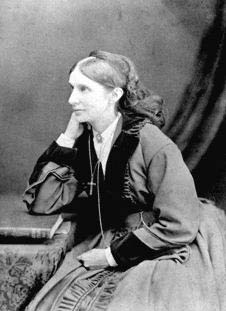Readings:
This commemoration is a 2018 addition to A Great Cloud of Witnesses
Return to Lectionary Home Page
Webmaster: Charles Wohlers
Last updated: 3 November 2018
JOSEPHINE BUTLER
SOCIAL REFORMER, 1906
 Josephine Elizabeth Butler (13 April 1828 – 30 December 1906) was an English feminist and social reformer in the Victorian era. She campaigned for women's suffrage, the right of women to better education, the end of coverture in British law, the abolition of child prostitution, and an end to human trafficking of young women and children into European prostitution.
Josephine Elizabeth Butler (13 April 1828 – 30 December 1906) was an English feminist and social reformer in the Victorian era. She campaigned for women's suffrage, the right of women to better education, the end of coverture in British law, the abolition of child prostitution, and an end to human trafficking of young women and children into European prostitution.
Grey grew up in a well-to-do and politically connected progressive family which helped develop in her a strong social conscience and firmly held religious ideals. She married George Butler, an Anglican priest and schoolmaster. The couple had a strong Christian belief and Josephine Butler later wrote that they often "prayed together that a holy revolution might come about and that the Kingdom of God might be established on the earth". They had four children, the last of whom, Eva, died falling from a banister. The death was a turning point for Butler, and she focused her feelings on helping others, starting with the inhabitants of a local workhouse. She began to campaign for women's rights in British law. In 1869 she became involved in the campaign to repeal the Contagious Diseases Acts, legislation that attempted to control the spread of venereal diseases — particularly in the British Army and Royal Navy — through the forced medical examination of prostitutes, a process she described as surgical or steel rape. The campaign achieved its final success in 1886 with the repeal of the Acts. Butler also formed the International Abolitionist Federation, a Europe-wide organisation to combat similar systems on the continent.
While investigating the effect of the Acts, Butler had been appalled that some of the prostitutes were as young as 12, and that there was a slave trade of young women and children from England to the continent for the purpose of prostitution. A campaign to combat the trafficking led to the removal from office of the head of the Belgian Police des Mœurs, and the trial and imprisonment of his deputy and 12 brothel owners, who were all involved in the trade. Butler fought child prostitution with help from the campaigning editor of The Pall Mall Gazette, William Thomas Stead, who purchased a 13-year-old girl from her mother for £5. The subsequent outcry led to the Criminal Law Amendment Act 1885 which raised the age of consent from 13 to 16 and brought in measures to stop children becoming prostitutes. Her final campaign was in the late-1890s, against the Contagious Diseases Acts which continued to be implemented in the British India.Butler wrote more than 90 books and pamphlets over the course of her career, most of which were in support of her campaigning, although she also produced biographies of her father, her husband and Catherine of Siena. Butler's Christian feminism is celebrated by the Church of England with a Lesser Festival, and by representations of her in the stained glass windows of Liverpool's Anglican Cathedral and St Olave's Church in the City of London. Her name appears on the Reformers Memorial in Kensal Green Cemetery, London, and Durham University named one of their colleges after her. Her campaign strategies changed the way feminist and suffragists conducted future struggles, and her work brought into the political milieu groups of people that had never been active before. After her death in 1906 the feminist intellectual Millicent Fawcett hailed her as "the most distinguished Englishwoman of the nineteenth century".
more at Wikipedia